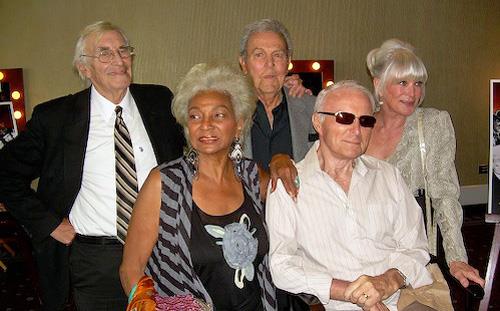
Robert Conrad didn't mind playing rough, both physically on-screen and verbally with TV critics who found fault with his shows.
He died over the weekend at age 84 after hooking earlier generations on three enduring TV series that ran hot back when television mainly boiled down to three big broadcast networks.
Hawaiian Eye, The Wild, Wild West, and Baa Baa Black Sheep provided steady employment for Conrad through the '60s and '70s before he struck out swinging with a trio of failed series – A Man Called Sloane, High Mountain Rangers, and Jesse Hawkes. In his later years, he was the contented radio host of PM Show with Robert Conrad, which aired through the summer of last year.
I had a number of brushes with Conrad, all of them memorable. The first came in January 1982 during a Los Angeles screening and interview session for NBC's Will, in which Conrad starred as the Watergate burglary's most infamous participant, G. Gordon Liddy. He proclaimed this an excellent fit after seeing the film for the first time while Conrad sat nearby. The two of them first met about 18 months earlier after Conrad had let it be known that he wanted to embody Liddy on the small screen.
In turn, "I wanted to know if he was real," Liddy said. "We closed a few bars together. I found out Bob Conrad is real. There's no bull*#!& with him."
Conrad returned serve, telling TV critics that playing Liddy was "the best role I've ever had. Gordon and I aren't the kind of guys who would have a beer together (never mind the aforementioned bar closings). But if I was going into a foxhole, I would be very secure with Gordon Liddy there. He is not one to back away from anybody. Gordon Liddy is a man."
A week later, at the end of a midseason press tour in Los Angeles, Conrad was the most vocal inquisitor during a panel in which four TV critics took questions from members of the TV industry. After it ended, I approached Conrad and asked him if he'd like to do a guest column focusing on his problems with how critics reviewed his work. He was more than willing to talk into my tape recorder.
"The pen is mightier than the sword," Conrad said in part. "And what I've seen happen, particularly in recent years, is a new kind of journalism that's sort of pseudo-intellectual reviewing, based on what the critic assumes the public wants.
"Rudyard Kipling said something about keeping the common touch. And I've always called myself a man of lower-class mentality. And when someone says that television is crapola, and represents himself as a TV critic, I question whether he's in touch with the general population. I doubt it… Maybe escapist fare is good therapy. Maybe it's the kind of thing that people really need after eight hours of manual labor or eight hours of stress on an upper-income job." (Conrad never won an Emmy Award. Nor was he ever nominated.)
Several years later, Conrad and two of his sons, Christian and Shane, were in Dallas to provide live commentary on the 1987 Cotton Bowl parade, which used to be televised on CBS. It was a very bad fit, as you can imagine. But the Conrads were mainly using the parade as a vehicle to promote High Mountain Rangers, which premiered on CBS the following night. Bluntly put, Robert Conrad feigning interest in a float was akin to The Three Stooges attending the opera. Cotton Bowl officials were not amused and went public with their criticism.
I last saw Conrad in August 2010 at a Pioneers of Television event held by PBS (photo at top, Conrad in sunglasses). He was joined by Linda Evans, Martin Landau, Mike Connors, and Nichelle Nichols. Toward the end, I asked Conrad about his extreme competitiveness on ABC's old Battle of the Network Stars specials and whether his "hate-hate" relationship with TV critics had softened over the years.
Conrad credited an on-screen argument with CBS foe Telly Savalas with landing the famed battery commercial in which he knocked around a punching bag before daring viewers to knock an Eveready off his shoulder. The president of Eveready supposedly had seen Conrad acting tough and thought he'd be a perfect ambassador for the product. "Battle of the Network Stars got me a million dollars," Conrad said.
TV critics seem to hold him in higher regard now, he contended, referring to reviews of DVD sets of his hit series. "It's bizarre. I'm becoming a greater actor in reruns. I think the fact that I took my shirt off and was a macho man offended many. Not me. You should have seen my dressing room."
Whatever his views of TV critics – at the height of his career or on the back end of it – "you're entitled to your opinion," Conrad said. "You're not right most of the time – but you're entitled to it."
Fair enough.